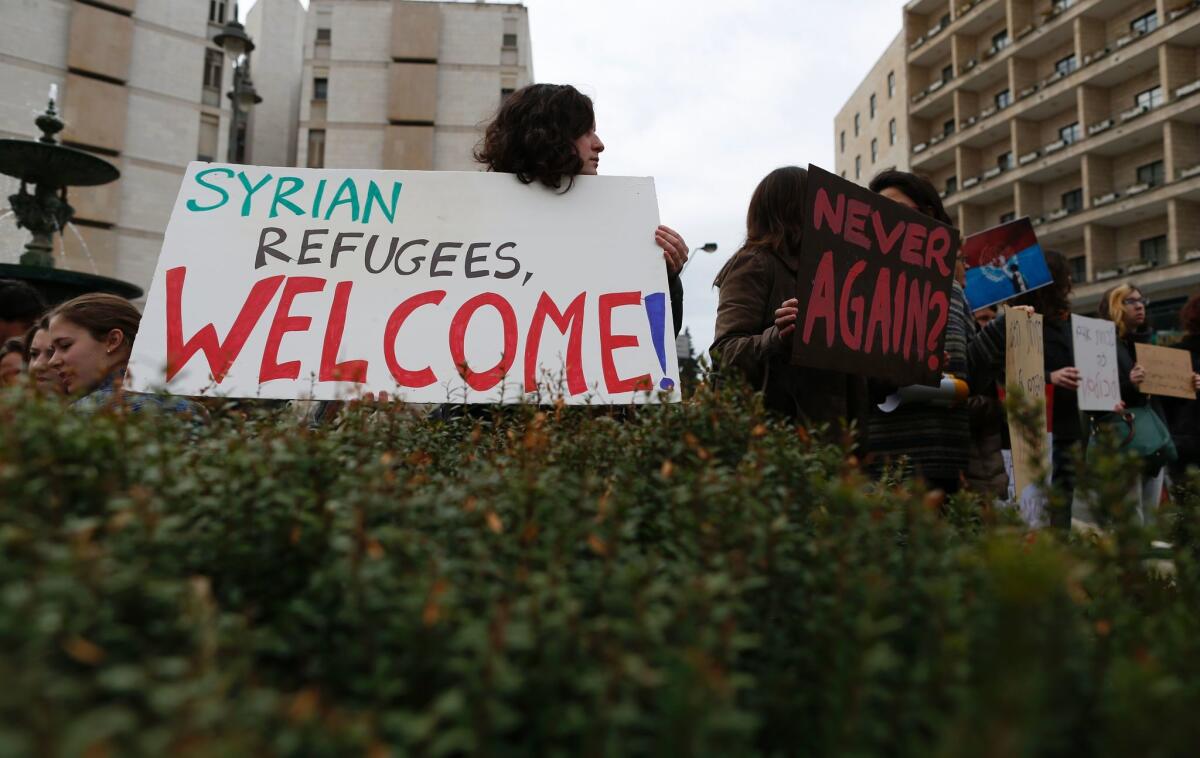Israel to grant asylum to 100 children orphaned in Syria’s civil war

- Share via
Reporting from Tel Aviv — While the United States was preparing plans to close its borders to Syrian refugees, Israel announced plans Thursday to accept 100 orphaned Syrian children from around the battered city of Aleppo.
Critics immediately dismissed the plans as window dressing designed to enhance Israel’s public image. Nevertheless, the proposal represented a change in Israel’s relationship with its northern neighbor.
While millions of refugees have flowed out of Syria into neighboring countries during the course of the six-year civil war, Israel has kept its doors closed to civilians fleeing a country with which it technically remains in a state of war.
Confirming a television news report from Wednesday, government officials said that the plan to bring in orphans is still in its preliminary phases and that Israel had reached out to the Office of the United Nations High Commissioner for Refugees for assistance in identifying candidates.
The children would eventually be eligible to become permanent residents, and Israel would consider accepting immediate family members as well, according to Israel’s Channel 10 television news.
“This is a just and important decision,” Itzik Shmuli, an opposition member of parliament, said in an interview with Israel Radio. “The government should be congratulated.”
From the archives: One country that won’t be taking Syrian refugees: Israel »
But Eyal Zisser, a political science professor at Tel Aviv University, said the plans, reportedly being drawn up by Interior Minister Aryeh Deri, were mostly symbolic.
“The minister wants to show empathy and show he’s doing something,” Zisser said. “The main issue here is that 100 is really nothing. It’s to show Israel’s nice face to the world and to address Israeli public opinion.”
Despite its refusal to accept Syrian refugees on an ongoing basis, Israel has temporarily admitted 3,000 Syrians for medical treatment and hospital care over the last four years from rebel-controlled villages near the countries’ border in the Golan Heights. The army has set up a field hospital on the border, and sent limited shipments of medicine, food and blankets over the border to aid those villages.
Seeking to avoid being drawn into the Syrian civil war, Israel has remained on the sidelines of the fighting. It has made exceptions to defend its border in the Golan Heights — which was bulked up with a fence — from spillover in the fighting and also launched strikes inside of Syria to intercept weapons systems destined for Hezbollah, the Shiite militant organization in Lebanon.
As the desperation of Syrians to reach Europe caught international attention in 2015, Israeli opposition politicians argued that the country had a moral obligation to absorb refugees, given its history as a shelter for European Jews who survived the Holocaust. The calls to take in refugees were rejected as too risky by Israeli leaders, including Prime Minister Benjamin Netanyahu, who said that Israel was too small to absorb Syrians.
The appeals in Israel surged again at the end of 2016 during the siege of Aleppo, which created a massive humanitarian crisis. A crowdfunding initiative raised more than $100,000 and Deri declared that Israel could not remain indifferent to the crisis in Syria. In December, Netanyahu said Israel had begun to explore the possibility of bringing refugees to Israel.
In addition to concern about the security risk from accepting civilians from an enemy state, Israeli officials have feared that accepting Syrian refugees could affect negotiations with the Palestinian Authority and its demand of a right of return to Israel. Some 500,000 Palestinians in Syria are considered refugees, and Israeli officials worry that giving Syrian refugees residency might bolster the claim of Palestinian refugees to residency rights there.
Israel has a restrictive immigration and refugee policy for non-Jewish migrants. In a span of about seven years, more than 50,000 Africans illegally crossed into southern Israel, most of them from Sudan and Eritrea. Israeli immigration officials have largely refused to grant requests for asylum, and instead have pressured the African migrants by putting men in detention centers.
Moti Kahana, an Israeli American businessman who has lobbied Israeli officials to accept Syrian refugees and founded a non-profit, Amaliah, to aid Syrians still in the country, commended the decision. But he said Israel could be doing more to help the Syrians living closer to the Golan Heights.
“The Israeli people woke up when Aleppo collapsed,” he said. “Why from Aleppo, because it sounds good politically? There are people 200 meters from the Israeli border.”
The Trump administration has drawn up plans, which were leaked Wednesday, to temporarily ban all refugees, and to enact a more permanent ban on Syrian refugees. President Trump has not yet signed the executive order that would put the plan into action.
Mitnick is a special correspondent
ALSO
Trump’s call for safe zones for Syrians would require buy-in from other countries
El Paso and Juarez know what happens when a wall divides two cities
With Trump in the White House, Israel moves aggressively to build on disputed land
More to Read
Sign up for Essential California
The most important California stories and recommendations in your inbox every morning.
You may occasionally receive promotional content from the Los Angeles Times.













